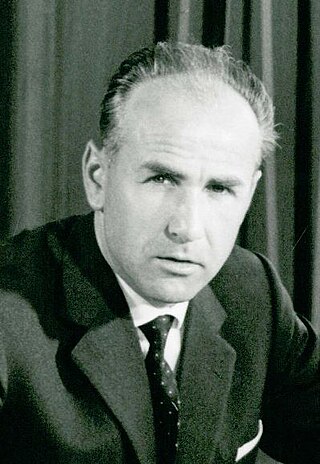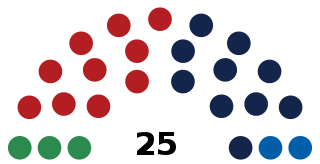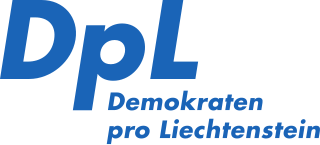
Liechtenstein, officially the Principality of Liechtenstein, is a doubly landlocked German-speaking microstate in the Central European Alps, between Austria in the east and north and Switzerland in the west and south. Liechtenstein is a semi-constitutional monarchy headed by the prince of Liechtenstein of the House of Liechtenstein, currently led by Hans-Adam II. It is Europe's fourth-smallest country, with an area of just over 160 square kilometres and a population of 40,023. It is the world's smallest country to border two countries, and is one of the few countries with no debt.

Political identity came to the territory now occupied by the Principality of Liechtenstein in 814, with the formation of the subcountry of Lower Rhætia. Liechtenstein's borders have remained unchanged since 1434, when the Rhine established the border between the Holy Roman Empire and the Swiss cantons.

Hans Brunhart is a politician and journalist from Liechtenstein who served as Prime Minister of Liechtenstein from 1978 to 1993. He previously served as Deputy Prime Minister of Liechtenstein from 1974 to 1978, under the government of Walter Kieber.
Same-sex marriage has been legal in Liechtenstein since 1 January 2025. In November 2022, the Landtag passed a motion calling on the government to introduce a bill legalizing same-sex marriage, with broad support from across the political spectrum. A bill legalizing same-sex marriage was introduced in February 2024 and passed its final reading in the Landtag on 16 May 2024 by a 24–1 vote. It received royal assent from Prince Alois on 9 July 2024. Polling suggests that a majority of Liechtensteiners support the legal recognition of same-sex marriage.

The rights of lesbian, gay, bisexual, transgender, and queer (LGBTQ) people in Liechtenstein have developed significantly over time. Same-sex sexual activity has been legal since 1989, with an equal age of consent since 2001. Same-sex couples have had access to registered partnerships since 2011, and discrimination on the basis of sexual orientation has been outlawed in some areas since 2016.

Gerard Batliner was a lawyer and politician from Liechtenstein who served as Prime Minister of Liechtenstein from 1962 to 1970. He later served in the Landtag of Liechtenstein from 1974 to 1982 and as the President of the Landtag of Liechtenstein from 1974 to 1977. Additionally, he held numerous positions within the Council of Europe.

Alexander Frick was a politician from Liechtenstein who served as Prime Minister of Liechtenstein from 1945 to 1962. Frick is known for expanding Liechtenstein's foreign affairs and modernizing the country into a modern welfare state, while also serving over a period of economic boom in the country. He later went on to serve in the Landtag of Liechtenstein from 1966 to 1974 and as the President of the Landtag of Liechtenstein from 1966 to 1969.

The Landtag of the Principality of Liechtenstein, commonly referred to as the Landtag of Liechtenstein, is the unicameral parliament of Liechtenstein.

Diplomatic and economic relations between Switzerland and Liechtenstein have been close, with Switzerland accepting the role of safeguarding the interests of its smaller neighbour, Liechtenstein. Liechtenstein has an embassy in Bern. Switzerland is accredited to Liechtenstein from its Federal Department of Foreign Affairs in Berne and maintains an honorary consulate in Vaduz.

General elections were held in Liechtenstein on 4 April 1939. Although a new system of proportional representation had been introduced to pacify voters at a time when the country was under threat from neighbouring Nazi Germany, it was not used and the elections became known as the "silent elections" as no actual vote was held. Instead, the governing Progressive Citizens' Party and opposition Patriotic Union formed a coalition, assigning a roughly equal number of seats each, in order to prevent the German National Movement in Liechtenstein from acquiring any seats in the Landtag.

Three referendums were held in Liechtenstein during 2011. The first on approving the registered partnership law was held between 17 and 19 June, and was approved by 68.8% of voters. The law went into effect on 1 September. The second was held on 18 September on allowing abortion within the first twelve weeks of pregnancy. Prince Alois had threatened to veto the result of the referendum should it have turned out in favour, but ultimately it was rejected by voters. The third was on building a new national hospital in Vaduz was held on 30 October, and was also rejected.
This is an index of Liechtenstein related topics.

A referendum on building an approach road for an industrial zone in Schaan was held in Liechtenstein on 14 March 2010. The proposal was approved by 52% of voters.

A referendum on the financing of the Tour de Ski was held in Liechtenstein on 25 November 2018. The proposal was rejected by 59% of voters.

A three-part referendum was held in Liechtenstein on 30 August 2020. Voters were asked whether they approve of an initiative proposing changes to the constitution to promote the equal representation of women in political bodies, a parliament law allowing dual citizenship for naturalised citizens, and a decision by the government to fund a railway line expansion. All three proposals were rejected.

The Democrats for Liechtenstein is a political party in Liechtenstein. Formed as a splinter of The Independents in September 2018, the party initially held three seats in the Landtag of Liechtenstein. It won 11.1% of votes and two seats in the 2021 general election.
Two referendums were held in Liechtenstein during 2022. The first was held on 26 June 2022, in which voters decided on an exemption for pensioners from paying the annual deductible of the national health insurance. The second was held on 18 September on COVID-19 legislation.

Rainer Vollkommer is a German-Swiss classical archaeologist and art historian.

Eight referendums have been held in Liechtenstein in 2024.

Radio Liechtenstein, often shortended to Radio L, is the public radio station of Liechtenstein. It is the first and primary station to broadcast in Liechtenstein. They primarily broadcast local news, world news, music, sports, events and podcasts. There were plans to launch a radio broadcaster in the late 1930s, but this was discontinued. The plans to bring back the radio broadcaster began in 1991, with the station being launched on 15 August 1995. It is operated by the Liechtenstein Broadcasting Corporation (LRF) and funded by the Liechtenstein Government. The headquarters are located in Schaan.














